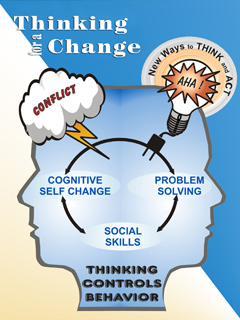Interview with Dr. Juliana Taymans
 Information Center: What are the biggest changes to the content in 4.0?
Information Center: What are the biggest changes to the content in 4.0?
Dr. Taymans: Thinking for a Change (T4C) 4.0 is still comprised of 25 lessons. The focus of each lesson has remained the same. Lessons now provide more detailed directions for facilitators as well as a more elaborated script. Each lesson has updated presentation slides with streamlined text. The result is a more user-friendly program for both facilitators and T4C group members.
Information Center: Can you speak to the importance of using technology to deliver the training online?
Dr. Taymans: NIC now provides support for hybrid training for T4C facilitators and advanced training for those taking on the role of training new T4C facilitators. The on-line portion of the training allows individuals from diverse locations to learn the program without having to travel or spend extended time away from their daily work duties. The on-line component of the training also allows a slower pace of learning distributed across multiple weeks. Both facilitator and advanced training are supported by final face-to-face sessions that allow training participants to develop and demonstrate essential competencies for face-to-face delivery of the program.
Information Center: Can you speak to the importance of implementing T4C?
Dr. Taymans: T4C is a carefully designed cognitive-behavioral intervention. The program is designed to be co-facilitated in a closed group of 8 to 12 participants who would optimally meet twice a week. T4C is a skill-building program which means that each group member has the opportunity and support to learn and practice targeted skills both within the group sessions as well as in their real lives. Fidelity to each lesson as well as the overall program design is crucial for T4C to be an effective intervention. Increasingly agencies are taking on the important responsibility to support T4C facilitators through coaching based on session observations as well as instituting conditions that support integrity (such as scheduling, providing materials and technology).
